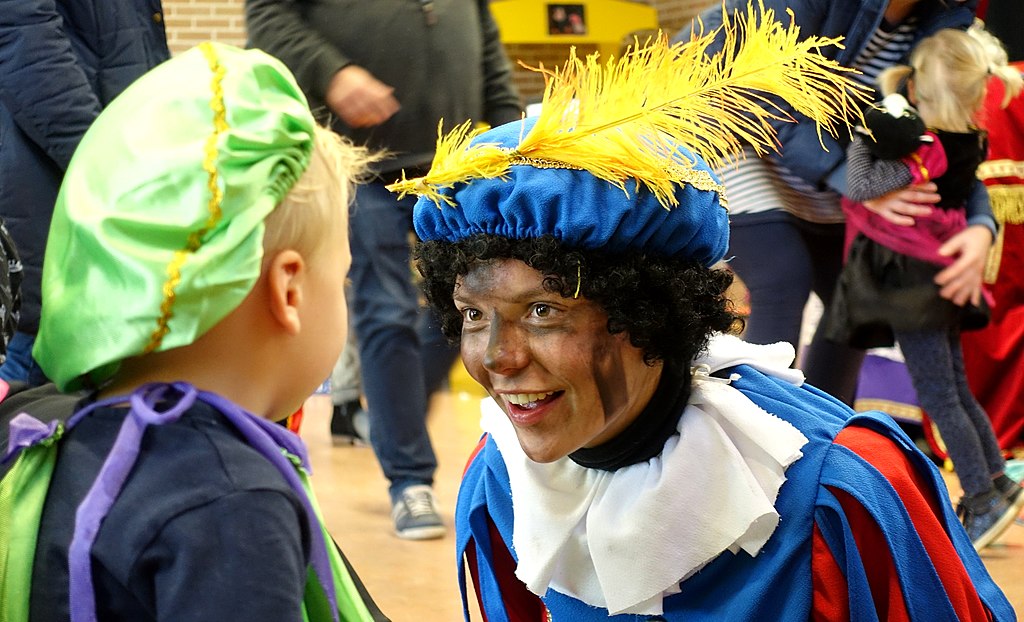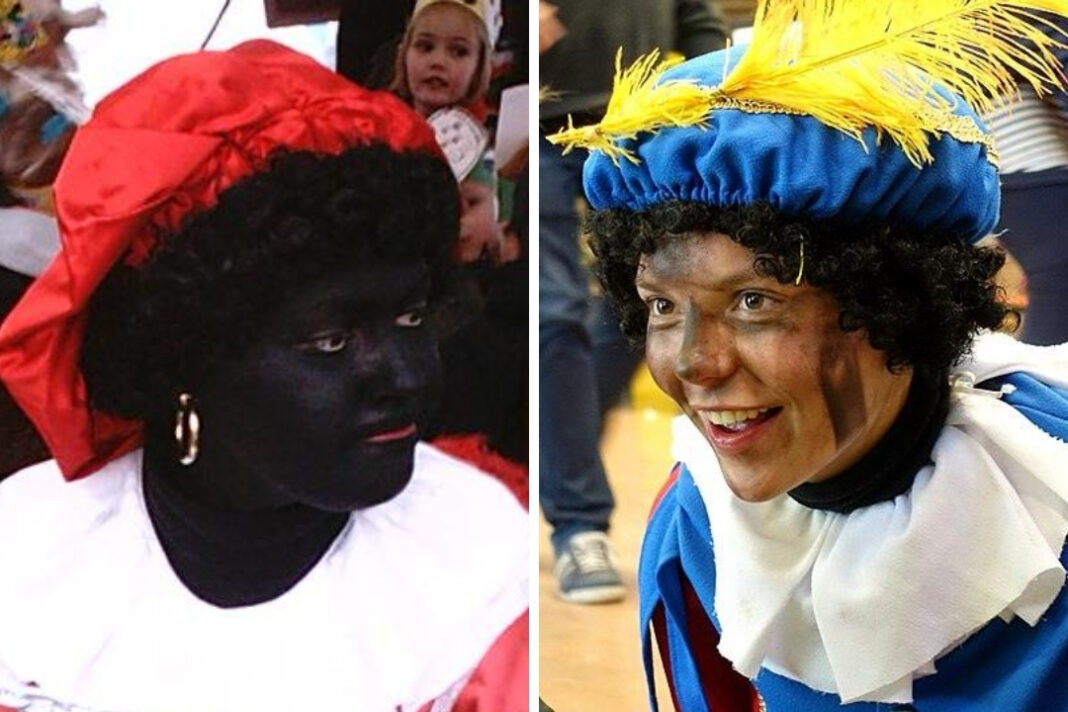Facebook made headlines across Dutch media this week after a surprise announcement that images of Zwarte Piet would be banned from its platforms. The move is hoped to help ward off “discriminatory stereotypes.”
Of course, as is the nature of the Zwarte Piet debate in the Netherlands, some Dutch are outraged that their beloved children’s character is being vilified and banned. Meanwhile, others are happy to see Facebook taking a step against institutionalised racism.
So what can you post, and what will be deleted? How will Facebook monitor the images? And what else do you need to know about Facebook’s Zwarte Piet ban? You’ve got the questions, and we’ve got the answers.
Why is the Zwarte Piet debate such a big deal?
Zwarte Piet, the cheerful children’s character who accompanies Sinterklaas on a present-giving journey has come under fire in recent years. Normally depicted in blackface, with large gold hoops in the ears, wide red lips, and curly black hair, some Dutch are realising Piet may not be the most politically correct character — particularly given the Dutch history of slavery.
On the other hand, for many Dutch, Zwarte Piet doesn’t represent bonds and chains. Instead, he is an important, whimsical figure from their childhood. They hold tight to memories of catching pepernoten and candy from various Zwarte Piets during Sinterklaas parades. Of course, there was always the threat for bad children that Zwarte Piet would put them in a sack and take them back to Spain.
Of course, in the era Black Lives Matter, blackface doesn’t really fly today — in fact, it’s downright frowned upon. And slowly, Dutch people are starting to realise that their beloved childhood character is actually a representation of the institutionalized racism that’s still present in the Netherlands today — Dutch Prime Minister Mark Rutte recently came to the same conclusion, and even Kim Kardashian has weighed in on the debate (although we’re still not sure why.)
What images of Zwarte Piet are no longer allowed?
If you were planning on posting a picture or video of Zwarte Piet in the traditional blackface, or with stereotypical features, we’ve got bad news for you — you can’t. Any images with these features can be reported and subsequently removed from the platforms.
Facebook, who owns Instagram, are very clear about their decision. Any images where “plain black face paint or make-up has been used to darken the colour of the face, along with other stereotyping features such as a wig with curls or large lips’ will be prohibited,” the company states.
What images of Zwarte Piet can be posted?
Technically no images of Zwarte Piet can be posted — but, images of Piets that are dirty from climbing up and down chimneys are allowed. There are two names for these Piets, and kind of adorable reasons for their varying levels of soot.
Soot Piet (roetvegenpiet)

This is a Piet at the beginning of his education of learning to help Sinterklaas. You can identify a Soot Piet by the streaks of soot on his face.
Chimney Piet (schoorsteenpiet)
Chimney Piet is far advanced at giving presents to children compared to Soot Piet. He has climbed up and down so many chimneys that he now appears grey in appearance. Take note: not black, but grey, from the soot of the chimneys.
Are there exceptions for posting Zwarte Piet images?
Simply put, yes. Images of the blackface Zwarte Piet that are part of a news article are allowed. Or, if there is a neutral or opposing discussion about Zwarte Piet on Facebook, you may also see an image of Zwarte Piet.
However, discussions in favour of the character are not allowed to have images — there is no exception in this case. “That would be a loophole,” Facebook says.
We already have enough worries about data mining on social media — but luckily, no robots will be involved in the removal of Zwarte Piet images. There’s a simple reason for this: writing an algorithm would be complicated and would risk picking up images of black people instead of Zwarte Piet. That would be a PR disaster.
Instead, the company will rely on users to report an image. The report then goes to a human moderator, who will check for exceptions and make a decision about whether the image should be deleted. Anyone who consistently breaks the rules risks the deletion of their account on Facebook or Instagram.
The ban is still a few weeks away from being implemented, despite being announced by Facebook earlier this week. First, the company must train its thousands of moderators on the new rules.
In the meantime, if you report a photo or video of Zwarte Piet to Facebook and Instagram it simply won’t work. Some users did try this after the announcement but were informed that the images were not against the rules.
Technically, Zwarte Piet is not banned in the Netherlands (although several municipalities have) so why is it not allowed on Facebook? This is the main argument of some of the opponents to Facebook’s new rule, claiming that it limits their right to free speech.
“I really see this as censorship. An American company that indicates what is or is not possible. It feels very authoritarian, something that is imposed, an infringement of the freedom of expression,” chairman of the Sint & Pietengilde, Marc Giling, told NOS.
Giling is frustrated that Facebook, an American company, has failed to take into account the historical and cultural significance. “It is a tradition of thousands of years, not only in the Netherlands but throughout Europe,” he says. “A masquerade, independent of colour, in different guises with different meaning. If you do not make a distinction between this in your guideline, it shows a lack of empathy and knowledge.”
However, other Dutch people support Facebook’s action on the polarising topic. “This is very positive, very encouraging,” says Jerry Afriyie, leader of the Kick Out Zwarte Piet action group. He believes Zwarte Piet is just blackface. “It cannot be that we continue to do this under the guise of tradition. People do not feel safe on a platform that they can unwittingly be confronted with.”
“It was about time,” added someone on Facebook. “Freedom of speech as enshrined in our constitution has nothing to do with being able to post or not post something on a social network run by a company.”
What do you think of the new rule change on Facebook and Instagram? Should it be taken further throughout the Netherlands? Tell us in the comments below!
Feature Image: Andre Engels/Wikimedia Commons/CC3.0 // Ziko van Dijk/Wikimedia Commons/CC4.0
How will the images be removed?
When does the ban begin?
What was the Dutch reaction to the ban?
Those against
Those in favour




Although Facebook and Twitter are the online equivalent of a members club, being global in nature it is hardly a private club. Thus, is banning certain content the same as a club allowing smoking at club venues? Or is it correct to say that any ban applied must comply with laws of the countries that can access their services?
Facebook and Twitter are just companies, not governments. They must comply with the law, not try to make their own.
For example, does banning content like Black Pete contravene Dutch law, where the character is widely accepted as cultural and not yet banned by Dutch law? Maybe country filters should be applied.
And why is being offended nowadays classed as a crime? Should causing offence be legislated by government, or should it only be a matter of upbringing? After all, we’ve all met polite folks just as we’ve met rude ones. How soon before Dutch directness is classed as offensive and outlawed by authoritarians and digital technocrats. Perhaps Facebook et al. will soon remove all Dutch content because they consider the Dutch themselves to be too objectionable.
About time! It is only a Dutch children’s festival if all Dutch kids feel included in it. And why in the world would we not change the image of Piet if that hurts quite a few kids?
There is no doubt that Facebook/Instagram can impose whatever restrictions they want being that they are a private company. However, in the United States, if they are what is considered a “public forum” they must allow ALL people to post on their site … And in return they are safe from prosecution from having illegal (ex. Child porn) material on the site. BUT — if they edit/refuse to post otherwise Legal Material They simply don’t like, the public forum protection does not extend to them.
I don’t know if this “anti-black face” ban will extend to the States, but if it does, rest assured, if they try to enforce it, they will lose. Even Ruth Bader Ginsberg, by far the most liberal member of the United States Supreme Court, has stated more than once that online “forums” cannot simply pick and choose what they want or don’t want on their site.